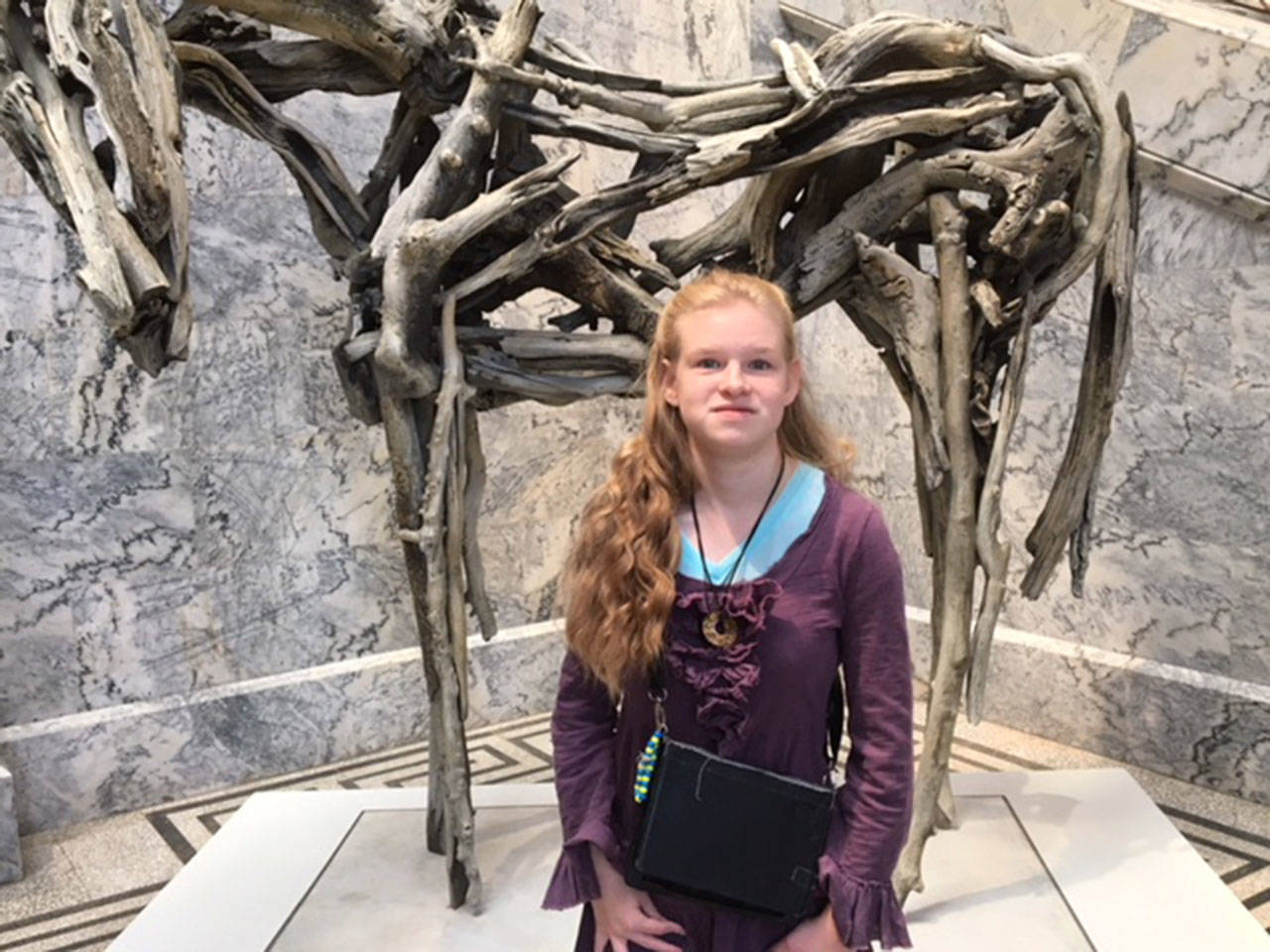Lili Light, a Friday Harbor High School student whose cerebral palsy complicates speech, fearlessly spoke in front of over 20 Stanford University students, discussing her life and her challenges.
“She did incredibly well,” said professor John Moalli, who teaches a Stanford class focusing on inclusive technological designs for the differently abled. “She came back a different person. I wish whatever it was, I could bottle that. She just did amazing.”
Moalli began the class after working with another Friday Harbor High School student, Zach Crighton, who, due to cerebral palsy, is wheelchair abled. The class came up with multiple technological ideas to help Zach be more comfortable and make communication easier.
Moalli also had a low vision student, Adrian Rodriguez, who is now a graduate of Stanford, present to his class. When asked by the class what his prospects were of being able to see by virtue of technology, Moalli recalled that Rodriguez replied, “What makes you think I want to see? I see the world in a very soft way. Everyone is beautiful and there are no sharp edges, like a diffused watercolor. I like how I see the world.”
When Lopez Islander H’Sie Hayward, who suffered a spinal cord injury as a teenager, presented to the Stanford class, she said if she were handed a magic pill enabling her to walk again, she would reject it. She loves her life, to roll in her wheelchair, and all the amazing people she has had the opportunity to meet, Moalli explained.
“What I took away from this was profound. Differently abled people do not need to be lifted up, they just need to be included,” he said.
That notion is the crux of his class, Engineering with Empathy. Having his class meet and listen to differently abled people helps students understand the multitude of ways to create inclusive technology and design.
Last October, Lili, like Zach, flew down to California in Moalli’s private plane.
“She loved every minute of the flight,” said her mother Angela Light. “She has always been a thrill-seeking daredevil. She even has been indoor skydiving!”
Stanford is the second largest university in the world, Angela said, with its own zip code, three art galleries, farmer’s market, grocery stores, restaurants, and shopping centers.
Once at Stanford, she gave two 45-minute presentations, one to each of Moalli’s classes. Lili used her iPad, which is equipped with a speech assistance program, Proloque2go.
“Lili took her job of introducing herself and her unique challenges quite seriously,” Angela said. “The experience definitely changed her.”
After her presentation, the students worked on different ideas to assist with communication. Angela said witnessing Lili express herself with confidence and open-heartedness was her favorite part of the trip, and she expressed gratitude to the students who were receptive, engaged and respectful.
“Since Lili uses her iPad to communicate, the assignment to help Lili was to design an iPad case that she could use both in the standing and seated positions,” Moalli explained, noting that they named the case the “Lili Pad.” The students, he added, were so inspired by Lili, that many of them hope to make accessible design a part of their future careers.
“I was expecting to meet geniuses but I had no idea Lili and I would be in the presence of such soulfulness and incredible passion,” Angela said. “The youth there infused us with optimism for the future.”
Moalli hopes Lili will return to his Stanford class, stating that he believes Assistive and Augmented Communication technology will continue to benefit Lili. ACC includes communication devices such as iPads, giving assistance with communication for those who have difficulty with speech and hearing.
“The paraeducators who Lili and Zach have in the high school are amazing and dedicated to the growth of the differently abled,” said Moalli. “While the instructors are amazing, students like Lili and Zach could benefit from more technology. It is out there, but not affordable with current budget restrictions.”
Paraeducator Jane Burton Bell worked with Lili off and on since she was in elementary school. Bell, along with Angela, flew down to Stanford University with her.
“It was a big challenge for her, presenting,” Bell said. “But she was not fazed in the slightest.”
Since returning from the trip, Moalli and Bell noted, Lili has become more independent, often times saying, “I can do it myself.”
Lili is creative, Bell said, and an incredible artist. As gifts for the best ideas, Lili gave Moalli’s students cards she designed. These cards are cherished by the students who received them, Moalli said.
Going forward, Bell said she could see Lili putting a lot of energy into and excelling in art.
“I learned (from the trip) not to underestimate her desires or abilities,” Bell said.
Watch Moalli discuss one of his Standford University classes at a Tedx San Juan Island, below.
Watch a clip of Lili’s trip here.




